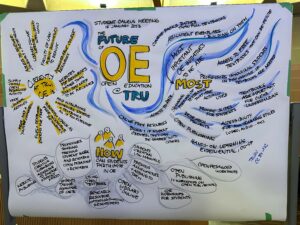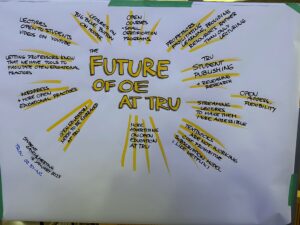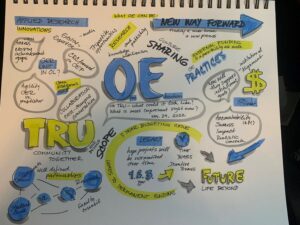4 Application Form
Project submission form instruction fields are in blue:
Please use the form below to complete the project proposal. Note that applications for ISP funding should not exceed 7 pages (excluding the budget). Applications should be completed as single-spaced documents using 12-point font.
The criteria below are in a chart format in the application form:
| Project Title
|
TRU Open Press |
| Guiding Principles | Project Proposal Requirements
|
| Collaborative and inclusive of a wide-range and diversity of units; must include academic unit(s) and students.
(20%)
|
List the project collaborators. Note that project teams must be inclusive of a wide-range and diversity of units, at least one of which is an academic unit.
The following visual recordings are from TRUSU’s student caucus focus groups, and meetings with project partners.
|
| Multi-year projects that are aligned with at least one of the strategic priorities
(10%)
|
Describe the purpose of the project and the strategic priorities to be addressed. Include relevant institutional data or literature supporting the project purpose.
Our goal is to be the publisher of first choice for TRU faculty when they create educational and scholarly materials. The TRU Open Press combines the existing strengths of TRU’s celebrated open platforms and expertise in learning design and resource development to offer wrap-around supports for the creation and development of open educational resources, open scholarship, and open pedagogy projects. The intention of the press is to solidify the existing infrastructure to be ready for TRU’s next phase as a research-first university while celebrating and supporting the existing community ethos to teach and learn in the open. The Press will be a “one stop shop” provider of all necessary expertise in web-first publishing (PressBooks), open pedagogy and open scholarship (WordPress), student voice and scholarly knowledge mobilization (podcasting, blogging, video), and interactive media for homework systems (H5P). This project seeks to resolve a number of cross-university concerns, including:
In a moment where academic presses struggle to remain relevant to a changing market, TRU Open Press is digital-first, differentiated by a commitment to unique and compelling knowledge mobilization strategies and expertise in the development of interactive media. No one else in Canada – or beyond – has the in-house expertise of TRU in all of these areas. It’s time to reframe and invest in our assets, especially as TRU looks to a research-focused future. This project addresses TRU’s Strategic Priorities in the following ways: Priority 1: Student success and research innovation through inclusive excellence in research faculty and staff recruitment.
Priority 2: Eliminate achievement gaps across different groups of learners, and honour, truth, reconciliation, and rights.
Priority 3: Recognized provincially, nationally, and internationally for our unique academic and trades programs that provide students with flexible learning pathways, and experiential learning and community-engaged research opportunities.
List the project deliverables and timelines for implementation and assessment of impact. ISP projects should be multiyear (2-3 years). Project Deliverables: Year One:
Year Two:
Year Three:
In addition to these deliverables, we will report out regularly to stakeholder groups with the following schedule:
|
| Student experience lens embedded throughout
(20%)
|
Describe how the project, design, implementation, and evaluation will incorporate a student experience lens.
1. OER Development: centred on improving student experience with student involvement at all levels of development and implementation. In particular, student experience will be improved through a focus on localization, Indigenization, and internationalization of OER published by the press, engaging a sense of wholistic belonging for students. OER success will be measured by uptake and therefore cost savings and learning outcomes for students. 2. Jobs: TRU Open Press will employ students as content RAs and as project developers. In these positions, students will develop skills in research and editing; knowledge mobilization; 3. Experiential Learning: The TRU Open Press will function as a much needed opportunity for students to apply their learning in supported professional contexts, particularly students in Public Relations and the proposed Major in Communication Design, who will be looking for opportunities in areas digital content production, layout, graphic design, etc. CVA aims to have capacity to require 3 credits of Experiential learning for every graduation in Communication and Journalism in the next 3-5 years. The Open Press will be an essential partner to achieving this goal, along with other campus-connected opportunities like the Omega, the Community Radio, the Wolfpack etc. Opportunities for course-based projects related to the design and publication elements could also be explored. 3. Academic Programming (Communications): Particularly in the area of Professional writing, we have been working towards processes and resources for pulling together collaborative teaching and learning materials (like a living case study bank, and OER with an emphasis on ancillary resources for teaching professional writing). This is particularly important in areas where there are multiple sections of standard courses and a significant reliance on sessional faculty. The Communications and Visual Arts department has therefore committed to using TRU Open Press to support their academic programming. From this leadership role for Communications, we anticipate other large first-year courses following suit. 4. Disseminating research: In addition to training students in the development of scholarly publishing, TRU Open Press will prioritize the development and support of platforms for publishing original undergraduate and graduate research at TRU and beyond. This includes open journals and open web projects, as well as training students in open data storage practices. Students who have worked with the TRU Open Press will be well-suited for future work as researchers in the current publishing climate. |
| Strong assessment and evaluation process
(30%)
|
Detail the project evaluation and assessment process, including objectives, outcomes, and measures that will be used to track impact.
Evaluation Plan_Open Press_15Feb2023 Baseline data
|
| Capacity building (scalability and sustainability) beyond the life of the project
(20%)
|
Describe how the project will build capacity at TRU and, if appropriate, how it will be sustained beyond the life of ISP funding.
TRU Open Press will centralize existing tools and expertise at TRU in order to ensure stability and growth. These resources include:
This work is already happening across TRU, but decentralization has meant an inefficient use of resources and unsustainable workloads. Our goal in establishing the TRU Open Press is to ensure faculty have a single point of access for all the services they need to achieve their open education goals and align with open mandates from external funding agencies. Bringing this work in-house also protects faculty intellectual property and student learning materials for continued iterative development. The TRU Open Press is also well-prepared to respond to shifting trends in publishing and to answer to needs like the development of open access homework systems. Resourcing this expertise effectively is necessary to ensuring TRU faculty are able to respond to a changing scholarly research landscape. By hiring students and connecting with faculty who may not already know about the existing resources, we will expand both capacity and demand for these services. The use of the TRU Open Press by departments like Communications and Visual Art to offer more consistency in materials across first-year courses will easily scale to any other departments who wish to engage. This project will have a life beyond the three-year cycle of the ISP funding, and a key task for the project manager is to secure continued funding, including from external sources. We believe that the TRU Open Press will become critical scholarly infrastructure for the entire TRU community as we step into our future phase as a research university. |
| Where appropriate, identify how you intend to engage authentically with community.
|
Describe how the project will build capacity at TRU in community engaged research and student research training.
A central component of this work is developing student fluency in the dissemination and creation of research and publishing. All funding from Tri-Council agencies now requires a comprehensive knowledge mobilization plan, and the TRU Open Press is ideally suited to use podcasting, blogging, and multimedia as a means of sharing research back into the communities most impacted by it; through experiential learning and jobs, we will train the next generation of scholars to be community-engaged and mobilization-minded. Further, all work published by the TRU Open Press is open access and cost-free to the end user, making it much easier for community members and people from marginalized communities to engage with the research produced by TRU. When it comes to developing OER, we are focused on the opportunity open practices provide to localize, Indigenize, and internationalize all work published by the press in order to reflect the communities in which our learners live, work, and engage. This is a critical component of the work of the TRU Open Press and the key argument for bringing texts in-house. This also allows us to develop projects iteratively as necessary and respond to errors, omissions, and changes. |
| Attach as an appendix a detailed Budget Request to be allocated by year
|
Please use the attached spreadsheet for providing a detailed budget breakdown.
ISP_Budget_Open Press 14Feb2023 Click or tap here to enter text.
|
| Dean, Director, AVP, approval | Please indicate below if all supervisors of project team members have been consulted about the scope of the project prior to submission.
☐ Yes (consultation is completed) ☐ No (consultation will be completed prior to March 31s, 2023)
|





